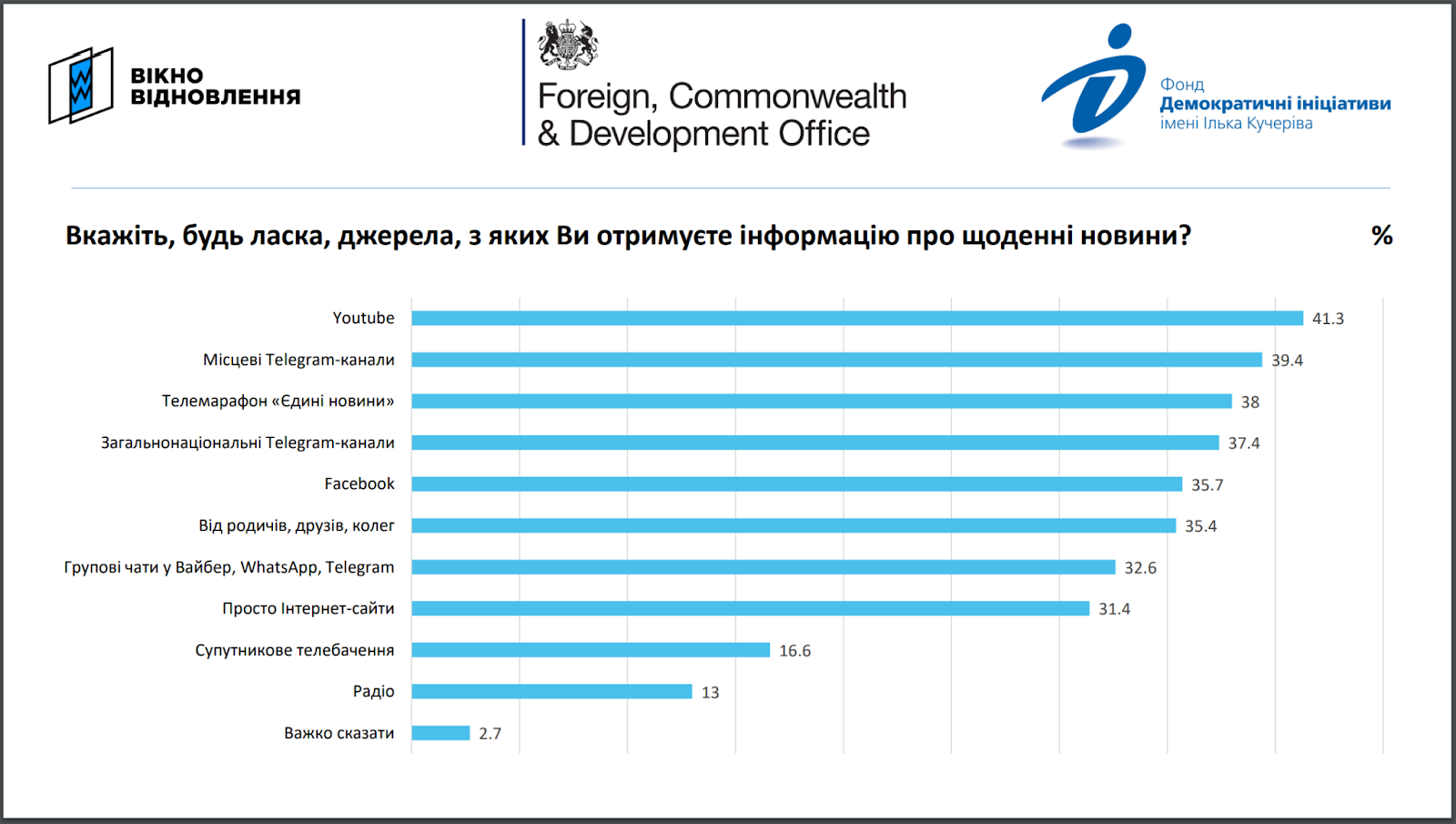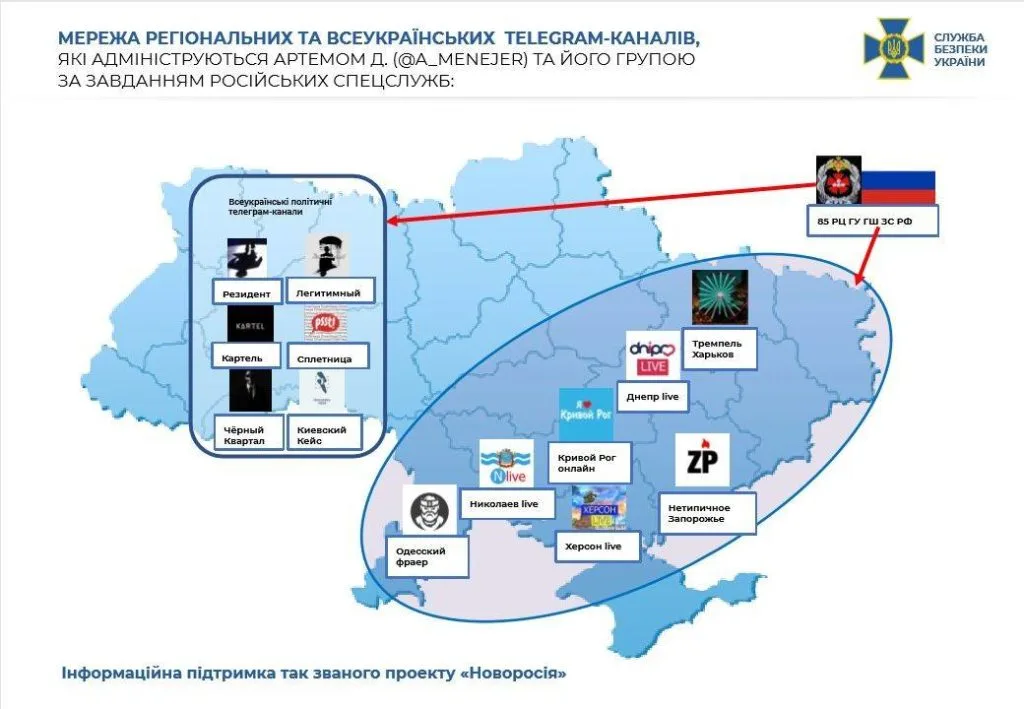“Telegram is definitely a problem for national security. This must be understood. I am also absolutely against the suppression of freedom of expression. But this is already too much.
So in our country, anyone can open a channel, start writing whatever they want on it, and when they start doing something, they can hide that this is the freedom of the mass media. But this is not media freedom, it is remembered a little differently.”– said Kyrylo Budanov, head of the Ministry of Internal Affairs and Communications, during the KyivStratcom Forum 2024.
Such statements always cause significant repercussions in society. And this is not surprising: according to sociologists, 49% of Ukrainians They believe that state control of information on Internet resources will only lead to the restriction of citizens’ rights and freedoms, and 44% still believe that it is necessary to protect against the enemy. But such a dichotomy is not entirely correct, since control over the information space does not necessarily contradict rights and freedoms, but often even supports them.
“New media” and old problems
The main argument of those who defend the “absolute freedom of the Internet” is that any control is perceived as censorship, the introduction of “dark rooms” and other anti-democratic humiliations. But let’s try to adapt this logic to classical media. Let’s imagine a magazine in which neither the author’s team nor the publication’s address is included in its columns, and most of the material is unsigned. Therefore, where it is published, who owns it, who runs the editorial office, etc. Unknown. I agree, such a publication will at least look dubious and will hardly gain public trust. Meanwhile, anonymous Telegram channels and pages on social networks often gather tens of thousands, or even millions, of subscribers, and these subscribers for some reason do not delve into the question of who tells them the daily news.

Data obtained from the survey conducted by the “Democratic Initiatives” Foundation on March 3-12, 2024 İlka Kucheriva together with the Center for Political Sociology commissioned by the media network “Recovery Window Media Network” (UA Recovery Window Media Network)
According to current legislation, the media is responsible not only for the dissemination of Russian propaganda, but also for many other violations. Moreover, thanks to internal self-regulation within the journalistic workshop, no mass media can publish “jeans”, slander, unbranded advertising and the like with impunity.
you do not want Fines and sanctions? Would you like to be on the white list of responsible media? Please follow the rules. Most importantly, these rules are written in the interests of the end user, that is, the audience – it is they who want to be protected from the selfish activities of unscrupulous media. Instead, Ukrainian Telegram channels, not subject to any regulatory mechanisms, quietly make money from classified ads and commissioned broadcasts, manipulating public opinion for the sake of enrichment.
But the mentioned mechanisms not only protect the reader from “jeans”. Objective and impartial coverage of events, balance of opinions, separation of judgments from facts, verification of information – all these are not empty slogans, but important principles, the rejection of which instantly turns the media into a garbage dump. Would you like to read an “investigation” where only the suspect’s position in corruption is presented, but instead the evidence against him is left inconclusive? Do you want a report where the story is distorted and half the characters are made up? What if the news feed contained half the gossip the “journalist” heard on the trolley? The fact that the mentioned rules have been violated does not mean that they are unnecessary. And again, the rules work primarily for the benefit of the audience and set mandatory standards for the media and journalists.
Editing day
The development of the Internet and the emergence of new technological possibilities have led to millions of people being given the opportunity to create their own content, and this is absolutely wonderful. But over time, along with the “old media”, “new” ones also appeared: social networks, Internet radio, YouTube channels, Telegram channels, etc. They have become sources of information for large masses: today, for example, the majority of Ukrainians He learns the news from YouTube, Telegram channels and Facebook. “New media” actually took over the function of “old” media, but did not undertake to comply with the relevant rules of operation, compliance with reading – content quality standards.

For this reason, discussions about the need to regulate “new media” began in the world. This problem became especially acute after the 2016 US elections, when Russia actively influenced American public opinion through social platforms. Later, laws regulating social media were passed in Germany, Australia, Canada and many other countries. Since then, the construction of a legal ecosystem designed to regulate new media has not stopped. So, in the summer of 2022, the European Union adopted the Digital Services Act (DSA) and the Digital Markets Act (DMA), which regulate the activities of technology companies on the European market and at the same time close some loopholes for the spread of counterfeit products.
Unfortunately, editing doesn’t always work. When the Russian social networks VKontakte and Odnoklasnyki, as well as a number of other Internet resources, were blocked in Ukraine in 2017, part of society perceived this negatively as a restriction of freedom. But this step was necessary because these sources were not only a propaganda platform, but also a source of Russian special services’ personal data on Ukrainians. Today, even the extremely popular Telegram messenger has proven to carry a number of features. real threats. He is financially and technologically connected with the Russian Federation and is also very liked by the Russian special services, who can, for example, even have access to deleted correspondence in the messenger. Hence the discussion of the idea of blocking Telegram, which, unfortunately, is often presented as an “attack on freedom of expression” or even an attempt to follow the example of totalitarian Russia.
However, calling the blocking of some websites a sign of “dictatorship” is a clear manipulation. For example, the United States could be considered a dictatorship. However, in early March 2024, the House of Representatives approved a bill that would pave the way for TikTok to be blocked. It is assumed that ByteDance, the company that owns the service, will have to sell the service to a non-Chinese owner within six months, otherwise TikTok will be blocked in the USA. Such a solution cannot be said to be popular, because the service is used by approximately 150 million Americans, who spend, on average, almost an hour a day on TikTok. But lawmakers are guided by security considerations: The TikTok app could be used to collect data and manipulate public opinion in the interests of the Chinese government.
Freedom is safe
Therefore, regulation of online sites has long been a normal global practice and is determined by the objective security needs and interests of the target audience. Unfortunately, the “absolute freedom of information” that internet enthusiasts of the last century believed in turned out to be an illusion. A good example of this is what happened to the social network X (Twitter) since Elon Musk began to change the platform’s policy in accordance with the principle of “unconditional freedom of expression”. According to this Breaking security standards has made X much more convenient for Russian propaganda, the European Commission’s investigation found. Analytical center DFRLab also noted an active increase in the number of subscribers to Chinese and Iranian propaganda resources. This has almost nothing to do with true freedom of expression.
We have already seen how destructive and sometimes literally deadly propaganda can be. Informational aggression is not a metaphor, but an objective and threatening reality. Therefore, regulation of the Internet space and sometimes restrictive measures is a mandatory requirement. It is equally important to normalize the activities of the sources that actually fulfill the role of the media. Quick and easy solutions are impossible here, but there is no other way; This is the only way to protect the interests of information consumers and protect them from the unprofessionalism and dishonesty of the newest actors in the media field.
The material was prepared by the editorial office “Center for Strategic Communications and Information Security” for the Ukrinform website.













